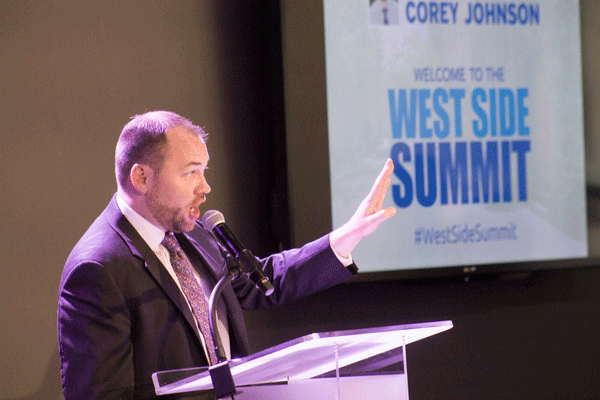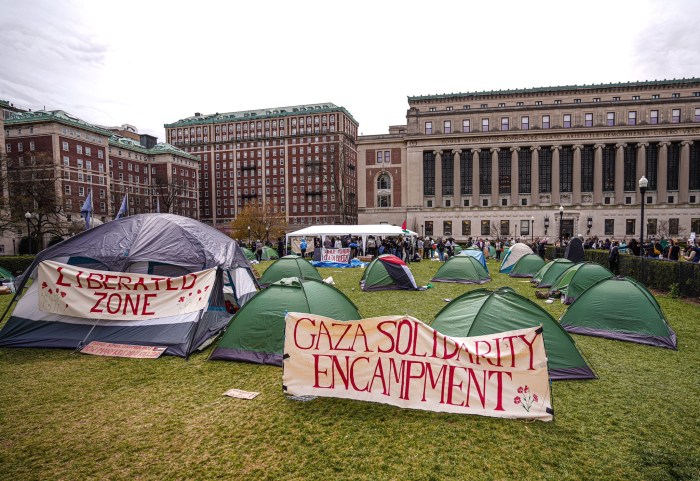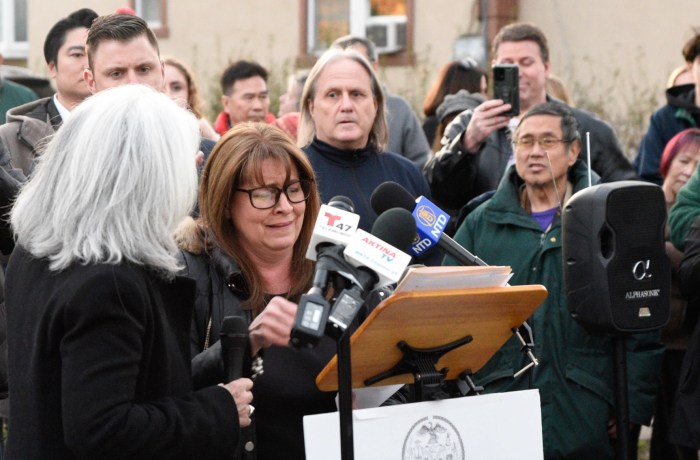
BY ZACH WILLIAMS | In the end, slightly more than 500 votes was sufficient for local improvement projects to receive funding through the participatory budgeting process.
Councilmember Corey Johnson announced the results from the April 11-19 vote on Sat., May 9, at the inaugural West Side Summit, held at Civic Hall, at 156 Fifth Ave. at W. 20th St. The event featured an hour’s worth of remarks from local elected officials on issues pertaining to City Council District 3 — one of 24 Council districts that held participatory budgeting this year. A keynote address on the makings of an ideal neighborhood came from Margaret Newman, executive director of the Municipal Art Society of New York.
“There are certain buildings, parks, intersections that bring meaning to our neighborhoods that provide tangible and intangible benefits,” Newman said. “One working definition is that a successful place is one which attracts a diverse set of users, helps spark social, cultural and economic enterprise and contributes to a sense of community and global citizenship.”
About 2,500 residents of at least 14 years of age cast votes in the participatory budgeting process — about 10 percent of the turnout for the last City Council election. Nonetheless, Johnson stuck an upbeat tone as he announced the projects that will receive funding of about $1.1 million through his office’s discretionary budget upon approval of the city budget in early summer.
The big winner was an effort to create a park at 136 W. 20th St. (between Sixth and Seventh Aves.), which received 1,342 votes — nearly 600 votes more than its closest competitor. The funds will pay for the demolition of a Department of Sanitation building there, as well as environmental cleanup of the site.
City records indicate that the city still owns the building: Sanitation vacated the property and relinquished it to the Department of Citywide Administrative Services in March 2013. But it will be difficult to predict just how much more money it will take to realize the community’s hope of establishing a public space there. It’s been a dream already five years in the making. According to Parks, additional funding hasn’t yet been identified for the project.
Creating a new park requires a three-part process: design, procurement and construction. A project becomes official when it has secured full funding and has a designer assigned, according to Parks.
Local resident Pamela Wolff was nonetheless pleased that the proposal prevailed in voting, even though the effort’s ultimate success remains to be determined. She noted that this current project is progressing faster than the three-decade-long effort to create another prominent local park.
“This is five years, which is not long given how long it took to get Chelsea Waterside Park to get off the ground,” she said.
An $85,000 idea to create an interactive garden for local children about ethnobotany and native fauna at Chelsea Waterside Park (at 11th Ave. between W. 22nd and W. 24th Sts.) received the second-highest vote tally, 748 votes.
The call of nature, however, was what ultimately determined the extent to which multiple projects could receive funding.
Bathrooms for Jefferson Market Library in the West Village (648 votes) and restroom improvements at the LAB School in Chelsea (594 votes) each had a $500,000 price tag. Johnson said before the voting that there was a chance that his office would fund projects beyond the intended $1 million allotted to each district for participatory budgeting. These two projects, however, came in at third and fourth place, making the top four projects require nearly $1.3 million in funding.
However, three more projects became eligible for funding through participatory budgeting after the city’s School Construction Authority agreed to pay for the new bathrooms at the LAB School, according to Johnson. The beneficiaries of that development were sidewalk repairs on W. 26th St. at the Chelsea-Elliot Houses ($50,000 — 578 votes), library modernization at P.S. 3 ($35,000 — 533 votes) and a pilot-project raised pedestrian crosswalk at W. 45th St. and Ninth Ave. ($250,000 — 532 votes).
A vote indicates that a proposal received at least one out of the five allowed preferences among the 17 items on the ballot.
Teenager Liam Buckley was one of the “delegates” who backed one of the competing proposals during the months of preparation before the voting. He said he put in roughly 25 hours of work toward the cause, including attending meetings with Johnson’s staff, as well as LAB School community members. The proposal to get money for a new public address system for the school fell short. But a concerted effort to rally support through the P.T.A. and among students “flushed out” the vote for the bathroom idea, though city funding will ultimately come through another channel.
Cooperation among residents and politicians, as demonstrated through the participatory budgeting process, gets to the heart of how the democratic process plays out on the West Side, according to state Senator Brad Hoylman.
“It’s back to the fundamentals of what makes us democrats, and I don’t mean capital ‘D’ Democrats but small ‘d’ democracy,” he said. “Because we have seen in our system of government where people want to make decisions without consulting the people who they are supposedly representing.”
Hoylman took a swipe at Republican legislators in Albany for inaction on climate change. City Comptroller Scott Stringer highlighted his support for a $15 minimum wage. Congressmember Jerrold Nadler, meanwhile, spoke about the need to overcome congressional opposition to ongoing negotiations over Iran’s nuclear program. The Trans-Pacific Partnership economic agreement must be stopped from getting “fast track” support, he added.
Assemblymember Linda Rosenthal took praising Johnson to a new level, following the three other elected officials, who already had given quite a few compliments to the freshman councilmember.
She praised Johnson for the full six minutes she spoke. Indeed, their cats are friends, she said.

















